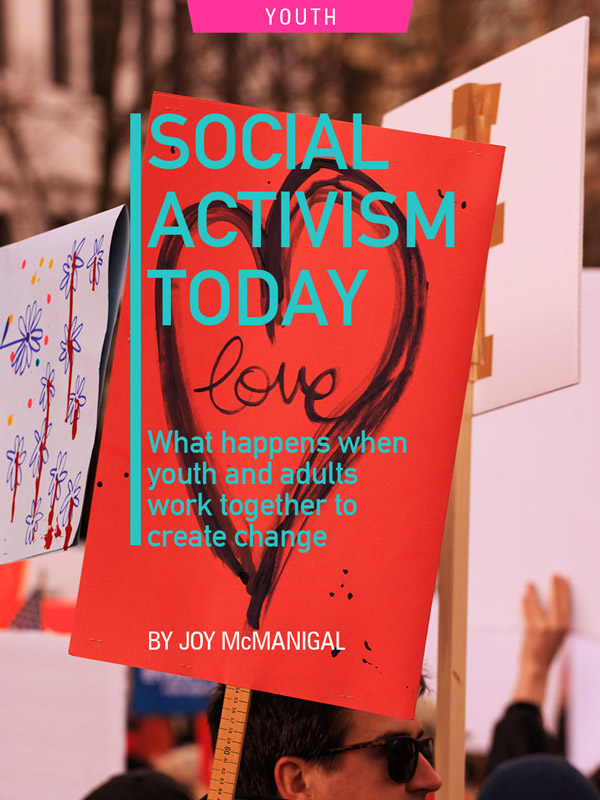Exploring the generational perspectives of youth and adults on collaborating for social change
—
I grew up outside of Berkeley in the 1960s, the golden age of Make Love, Not War social activism. Today we are experiencing another pivotal period of citizen engagement, often led by activists too young to vote. Anyone paying attention to local and national news will see people of all ages at rallies, walkouts, and town halls calling for common sense gun reform, among other issues. As the recent March for Our Lives gatherings across the country clearly illustrated, the fight for safe schools is both personal and close to home.
When I see or read about youth taking their protests to the streets (or the cover of national magazines), I feel a bit of nostalgia mixed with my optimism. Young people are once again on the front lines when it comes to social activism — but as any old hippie will tell you, it takes a village to create lasting change — a village of young and old working together to make the world a better place.
But what really happens when generations cross a picket line together? To explore that idea, I asked some adults and youth (ages 14-18) who have worked together as activists to answer the same five questions from their generational perspective. Here are their thoughts:
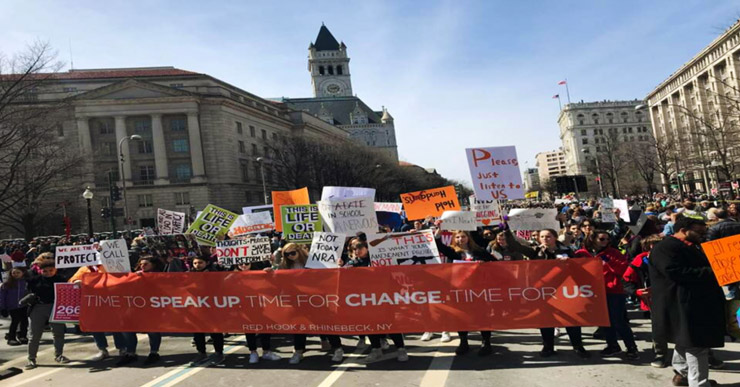
1) What is the best part about working with adults/youth in your quest to create change?
Mia Barbuto (youth):
The best part about working with adults is that they know that their time is up. They can stand by our sides and support us and agree with us and help us figure things out, but they know it is our generation’s time to create that change. They know that they have to step back and allow us to figure out problems ourselves because that’s the only way we will succeed. Not only do they allow us to figure out these problems, but they also share with us stories from when they were children trying to create change, and they subtly educate us without even knowing. They’re that wise voice in the background that subconsciously flows through our minds whenever we have to make a difficult decision.
Fiona Beer (youth):
The best part for me is when they listen to us. Throughout my life, my growing adolescent brain has been filled with: “Your opinions don’t matter because you are a child.” Being able to work with such open-minded adults allows us to be heard by a whole new generation, which promotes new ideas that eventually will lead to change.
Ruby Esposito (youth):
Fusing the two generations together to enact change opens up more opportunities for an even greater outreach to people. In my experience, working with adults has helped create a more powerful impact. I believe seeing everyone’s perspectives and utilizing multiple points of views makes for an even greater message, despite your age. I think this quote says it all: In unity there is strength.
Salma Ibrahim (youth):
The best part is educating them on how a lot of these social justice issues affect today’s youth. My friends and I were able to talk to our principal about how the dress code gives lots of girls low self-esteem because we feel it is a form of slut-shaming. She actually listened to us and by next school year the dress code was changed!
Stacie Fenn Smith (adult):
Their pure excitement and passion for the cause! They’re hopeful and you don’t want them to ever lose that. At the March For Our Lives, in order to truly feel empowered, we had to step back and let the kids take the lead. We helped to get the logistics laid out so the students could carry the message.
Lisa Hackett (adult):
Seeing their energy, passion and dedication. As a teacher, it’s always gratifying to watch kids mature into young adults. These student activists are such responsible citizens with an educated, thoughtful approach to their advocacy. From their creative posters to their documentary film vision, to curating a community art exhibit, their ideas are inspiring and exciting.
Kim Snyder (adult):
The best part for me is that it is reawakening my best adolescent self with all the piss, vigor, risk taking, unjaded hope, and unbridled energy that inspires and makes stuff happen. They are also a reminder of a more open time that allows shared goals to cut through a wide diversity of experiences and is more conducive to coalition building. And they fight hard. They do not relent.
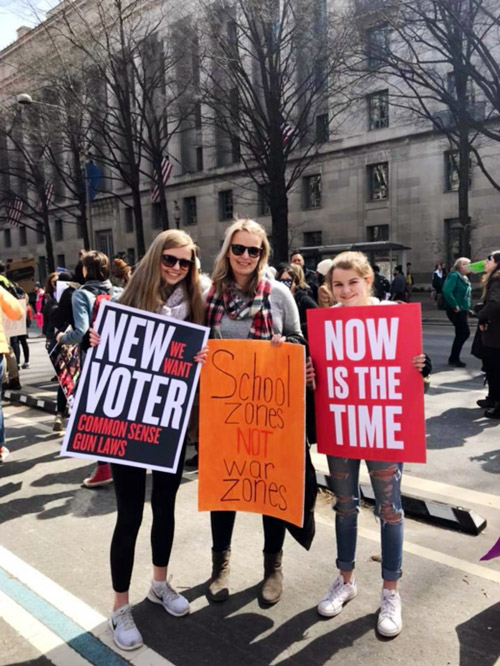
2) What is the most frustrating part about working with adults/youth?
Mia:
The most frustrating part about working with adults is that we’ve got them for a really long amount of time and then suddenly they’re gone. It happens in activism as it happens in life — you spend your whole life at home going to school while your parents take care of you and teach you lessons, then suddenly, just like that, they’re gone and you’re all alone, with no direction. In activism, you learn and learn and become your own leader and then suddenly you’re no longer the student leader, you’re the actual adult. You know it’s going to happen, but you never really see it coming.
Fiona:
Sometimes (not very often) adults receive all the credit for the hard work that the youth have done. It is not frequent that this happens, but it occurs enough that I notice it.
Ruby:
When it comes to issues such as school shootings and mental health among youth, it can be hard for adults to foster empathy because what they experienced as teens is very different from what the youth today are experiencing. It’s simply the difference between sympathy and empathy. I try to look past it as best I can because I know that typically their intentions are good; it all just comes down to communication.
Salma:
The most frustrating part is the fact that a lot of them still have some ‘backwards’ views. I always try my best to educate them, but a lot of the adults in my school administration and in my personal life still have a hard time with some of beliefs that the feminist and the LGBTQ+ communities are putting out in the world.
Stacie:
The fact that we have to march or even be advocates is the most frustrating part. Kids should be able to feel safe at school bottom line.
Lisa:
Fundraising is a bit of a slog. The other challenge has been in finding meeting times that works for the bulk of the students. These kids are involved in so many awesome things, but the drop off after the March has made it difficult for the few to carry out their plans and visions.
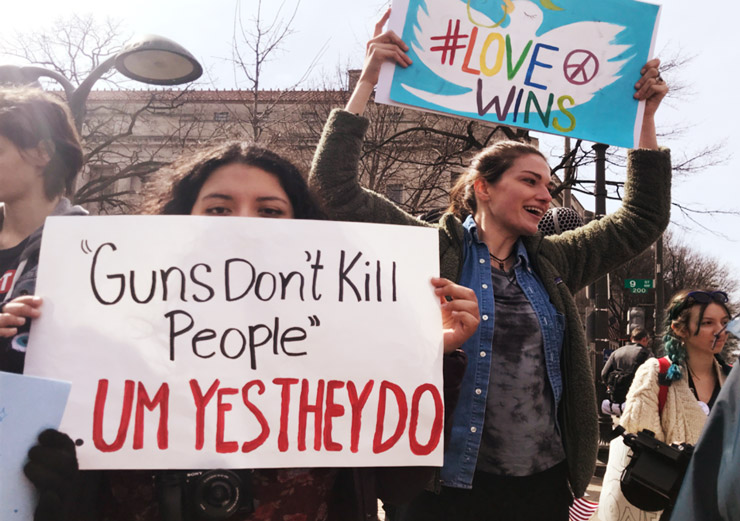
3) What can the adults/youth you work with do to be more helpful + effective?
Mia:
After the Parkland shooting, a bunch of students in my town automatically came together to talk about how we can unite the country without seeming like a threat to people who had prejudgments about the issues. It was amazing! A bunch of us got on a bus to go to the March in D.C. and we spent the day fighting for gun control and mental health awareness, but afterwards that spark after a terrible tragedy strikes, sort of went out. 5-10 people started showing up to meetings and that dwindled down to 1-3 people. After the Santa Fe High School shooting I thought they’d be outraged again and start coming back to meetings, but that never happened. I think the adults need to step in and be just as determined as that one student who is still trying to get at least 10 people to a meeting.
Fiona:
The adults that I have worked with have been absolutely wonderful, but they could do a better job promoting these movements and demands for change to the adult community because adults are more likely to listen to other adults.
Ruby:
I think it’s wrong that kids are not shown the same respect as adults purely because of the “you’re just a kid, what do you know?” mindset. Especially when tackling such huge issues as youth activists are nowadays, it seems implausible such young kids can make any change at all. However, that’s just not the case. The youth are more capable than ever, but without that respect from adults, division is inevitable. Respect is key.
Salma:
I feel the adults I work with could listen to what I have to say more and really consider the ideas that I have.
Stacie:
Keep on keeping on. Stay the course. Be organized, be persistent, and stay positive. Look to each other for help and support. There is power in numbers.
Lisa:
More leaders need to step up, as high school seniors who have been involved with marches/protests, letter/postcard writing, and registering voters get ready to go off to college. Those that can need to take the steps to educate themselves about candidates and get out the vote.
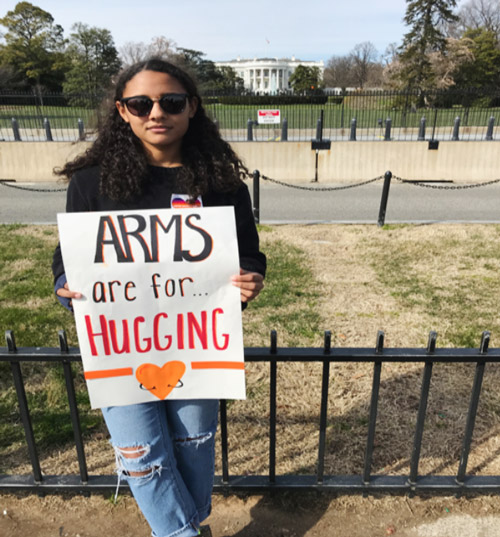
4) What do you wish adults/youth better understand about you + your activism?
Mia:
Adults need to hear us because the times are changing, the arguments are changing, and the definitions are changing. There is so much miscommunication today with our phones and social media. We need to start speaking face to face in order to get the truth, understand the truth, and relay the truth. Adults, we want your wisdom of experience, we want it so bad, but we also want you to hear what we have to say.
Also, I want you to understand that my activism is not a one-week deal. It’s not a two-month journey. My activism will not stop until I get what I want. I think a lot of adults think that I’m (we’re) tired, but there is so much injustice in this world that there’s no time to be tired. So I ask that the adults carry on with us because they once (and probably still do) have the passion I currently have rushing through my veins.
Fiona:
I wish adults could understand how greatly these issues affect my generation. They did not grow up going to school in fear of being shot in the head when you turn a corner or the fear of coming home to find out your younger sibling has been killed in a mass shooting. These are real, valid fears and I think they should be taken very seriously if there is going to be any sort of change.
Ruby:
We are all working toward the same end goal — and we deserve to be shown the same amount of respect as any adult.
Salma:
I wish adults better understood that social activism isn’t a trend and that a lot of these issues deeply affect me. I feel that some of adults don’t take me seriously because of my age.
Stacie:
In the classes I teach, we have talked at length about gun violence in schools. A hard concept for students to get is that feeling unsafe at school is completely new. It’s not normal, although it has become a norm for this generation. I never felt unsafe at school. We didn’t have a locked door, or lock downs, or a single point of entry. We just went to school. This is a hard concept for students to grasp because they’ve always had fear connected with school.
Lisa:
I think the rising number of teenage activists is a key factor in fueling their fire, although adults sharing their activism stories can help create historical context. They can also provide education and empathy for issues facing a broader range of ages/races/religions/nationalities.
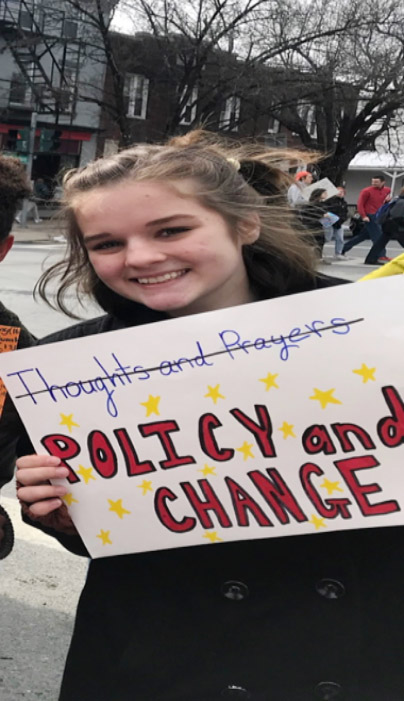
5) What unexpected thing have you learned about yourself + the world since becoming an activist?
Mia:
I’ve learned that inclusion is very important. Things people can relate to and are comfortable with are things they will listen to. If I go up to a conservative and shove in their face that guns are bad they aren’t going to listen to me, just like if a conservative came up to me and told me we need to arm teachers, I’m not going to listen. Seeing both sides is extremely important before you start shoving it in others’ faces what you think you know.
Fiona:
I have learned how to effectively get my point across, not to insult, shout, or get overly outraged at the opposing parties. To create real change and to start a conversation, we have to learn to listen to each other and compromise. I have also learned that the world can be a very cruel and hateful place. Not everyone is as open-minded and accepting as the people I have surrounded myself with growing up.
Ruby:
I remember looking around during the Austin student walkout in April and being overfilled with joy seeing the commitment and passion radiating from everyone around me. Despite everything going on in the world, this generation is bouncing back and channeling all the negativity into something positive and powerful. I’ve truly been shown that despite age, race, orientation, I am just as capable as anyone else to make — and be — the change in the world — not ‘some day’, but now.
Salma:
An unexpected thing that I have learned about myself is that I am very outspoken and brave enough to do whatever it takes to achieve equality and social justice. I used to think that nobody would listen to me. But I proved myself wrong. People actually did listen to me so I kept speaking up, ignoring hateful things people were saying about me. Something I learned about the world is that it is a very screwed up place right now, but if we all unite together we can achieve social justice and equality.
Stacie:
I feel more like a support person for the cause than an activist. Working with youth inspired me to be more committed to the cause. I also see it now from their perspective. It’s absolutely critical that something change and I believe wholeheartedly this generation will do it.
Lisa:
I’ve always voted. I’ve lobbied on Capitol Hill and contacted my legislators (although not nearly as much as I do now!). But these times are like no other in my lifetime. For the first time, I’m losing my Pollyanna feeling. There is a constant doubt that tries to sneak in and shake my core belief that humanity will triumph over evil. I find hope in the energy of the next generation, but feel disappointed that maybe their fight won’t be any easier or safer than ours. What has been most unexpected is getting to my age and finding us in what seems like the biggest challenge of our time: to preserve the values of our country.
You may also enjoy reading The C4 Way: Empowering Youth To Be Their Best Selves by Joy McManigal
